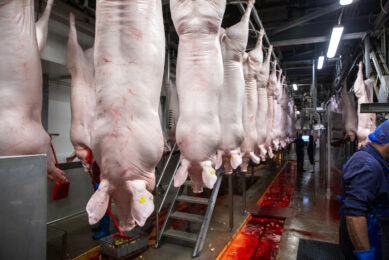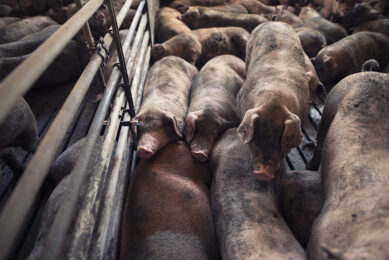Dealing with PED virus (I)

Much has been written about Porcine Epidemic Diarrhoea (PED) virus, this traumatic disease. In these notes John Gadd deals with the experiences of several large and efficient North American pig breeding farms who were badly hit by the PED virus last year and who are now reasonably back to normal productivity.
Several of them were my clients of preceding years whom I visited, so I knew their farms and their capabilities as knowlegable pig farmers and could trust their advice on their experiences. I also asked them if their veterinarian approved of what actions they took – just to be certain of their validity.
I contacted them for two main reasons. Firstly, discovering that the virus was similar to the TGE virus (Transmissible Gastroenteritis) raised my interest considerably, as 40 years ago on our own 1,200 sow Taymix farm and employed as its technical director, we were suddenly hit by TGE and lost nearly every piglet born for three solid weeks. Panic! Back then, the owner flew me to Minnesota which was the focus of the American outbreak, to try to find out from their veterinary epidemiologists what to do to curtail these disastrous losses, which if they continued for much longer, severely threatened our future cashflow and could finish us as a business. It now seems that what to do to combat and recover from PEDv could be very similar to what we were told to do for TGE all those years ago.
So what did they say?
This telephoned and emailed correspondence over the past six months reveals that – should we in the UK be unfortunate to contract the really virulent strain of PEDv (there is a less severe one, apparently) then the advice from Canada and America has been emphatic – even to the point of dogma. One farmer – one of the best-known pig managers in America, said to me, “Listen up – this is what you guys over there have just gotta do!”
Nevertheless, what they were all saying tended to conflict in places with what my training and experience in dealing with any disease from a managemental point of view – obtained from visiting hundreds of pig units across 40 years or more. What the Canadian and American contacts of mine were advising in the vital area of overcoming the trauma as quickly as possible made me nervous, but as the remarks in this and the following episodes suggest, there could be solutions.
Super-infectious
The PED virus is very highly-virulent. Already 2 cc of inoculum could infect every pig in Europe. PED took only a year to infect half of the huge and widespread US herd.
Comment: Footwear, clothes and vehicles, as well as birds are all primary vectors (pig transport trucks were critical viral transmitters, and staff at all levels, i.e. farms and their suppliers, must be made acutely aware of this). Should the virus arrive locally, extreme attention to farm biosecurity is essential, even to the point of refusing any visitors whatsoever, visiting other farms and the producer and his workers not attending farmer meetings. Just shoes leaving an infected farm are probably carriers – this particular virus being so infective that it is quickly picked up on other shoes treading the same space, so virulent are microscopic amounts of the virus. Spreading effluent from an infected farm on to its own fields was considered the height of stupidity and even then, once the farm is clear, should be delayed until warmer weather – the virus succumbs to heat and dryness but thrives in the cold.
National co-ordination speeds recovery
Each nation should have in place a regional surveillance and control plan co-ordinated from a national control centre. This has been, once it was established, a major factor in containing and eliminating the outbreak as quickly as possible – the Canadian example proves this.
Comment: We found this out at Taymix all those years ago when the similar TGE virus hit us. In the UK we are thankfully free of PED at present but our AHDB Pork (formerly BPEX) organisation is already publishing on-line some 14 Standard Operating Procedures (SOPs).











